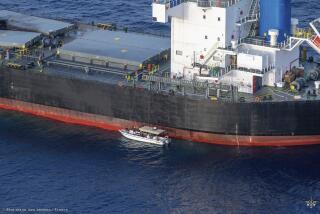Iran’s Jets Warned Off as Convoy Heads North
- Share via
KUWAIT — The convoy of American naval ships and “reflagged” Kuwaiti tankers headed into the northern Persian Gulf on Thursday after a radioed warning headed off an encounter with Iranian warplanes.
In Bonn, Iranian Foreign Minister Ali Akbar Velayati reiterated that his country would not attack shipping in the gulf, provided that Iraq halts attacks on Iranian oil exports.
Velayati told a news conference that if Iraq refrains from attacking Iranian shipping in the gulf under a new U.N. Security Council cease-fire, “then no ships will be attacked at all.”
But he also said that Iran would not join efforts to halt the almost seven-year-long war with Iraq until the United States ended its military buildup in the gulf.
French Adding Destroyer
Despite such assurances, the French government said Thursday that it will send an anti-submarine destroyer to back up the three frigates already in the area to provide protection for French shipping.
“Naturally, everyone can see that in recent days threats have increased and the events likely to affect us are multiplying,” said Defense Minister Andre Giraud in an interview with the daily newspaper Liberation in Paris. Giraud said the government therefore had “decided to adjust our naval potential in this zone by sending in the destroyer Georges-Leygues.”
In Tehran, Iran announced that it would hold naval maneuvers in the Persian Gulf, in the Strait of Hormuz leading into the gulf and in the Gulf of Oman beginning today.
Tehran radio quoted a spokesman for the Islamic Revolutionary Guards as saying its forces would be holding the maneuvers, to be code-named “Martyrdom.” The Revolutionary Guards have recently established a fleet of small, fast gunboats equipped with rockets to attack shipping in the gulf.
It was unclear from the Iranian announcement if the exercises would bring those gunboats close to U.S. warships in the area. The U.S. Navy now has about 15 ships in the Persian Gulf and the Gulf of Oman for the Kuwaiti tanker operation.
In Washington, National Security Adviser Frank C. Carlucci said U.S. naval deployments in the gulf will end when the threat to Kuwaiti shipping abates. Noting that the U.S. commitment to escort the American-flag tankers is not open-ended, he said the mission is conditioned on “unilateral” U.S. evaluation of the threat to those ships.
“If the threat abates, there would be no need to continue escorts,” he told reporters.
The convoy consisting of three American warships and two Kuwaiti tankers, the latter flying American flags and bearing new American names, entered the northern gulf on Thursday, according to shipping sources. The convoy, which set sail on its way to Kuwait from the port of Khawr Fakkan in the Gulf of Oman on Wednesday, is expected in Kuwaiti waters at around midday today.
Warning From Convoy
A dispatch from a pool of Pentagon reporters aboard the cruiser Fox, one of the escort ships, said that Iranian F-4 fighter-bombers flew toward the convoy Wednesday but turned back after a warning from one of the three Navy ships.
The dispatch, which was not released by the Navy until Thursday, said the flight consisted of four Iranian F-4s. The planes approached to within 15 miles of the convoy as it sailed through the Strait of Hormuz at the entrance to the gulf.
“We had some F-4s fly out of Bandar Abbas and stay inside their territorial limits as they came down toward us,” said Capt. William Mathis, commander of the Fox. Bandar Abbas is a major Iranian port at the mouth of the gulf.
Mathis said the U.S. destroyer Kidd detected the planes and “issued warnings to them, and they turned around and went back north.”
The crews of the warships were at battle stations while passing through the Strait of Hormuz because of uncertainties over Iranian shore batteries capable of firing Silkworm missiles obtained from China.
American naval officers report frequent contact with Iranian warplanes over the gulf, saying the Iranians always end by flying off.
The only U.S. casualties in the gulf were sustained last May when an Iraqi F-1 Mirage hit the frigate Stark with two Exocet missiles, killing 37 sailors.
Carlucci, in his session with reporters, also addressed another major concern in U.S. gulf policy: Soviet involvement in the region. He said Moscow has embarked on a determined campaign to increase its presence in the Mideast in general, offering to refinance Egyptian debts, making diplomatic overtures to the gulf states, holding discussions with Israelis on Soviet Jewish emigration and seeking to set up and take part in a broad Arab-Israeli peace conference.
But “until it shows signs of taking a truly constructive role, I don’t think an increased Soviet presence is desirable,” he said.
He noted that the Soviets have been reasonable in supporting the U.N. demand for a cease-fire in the Iran-Iraq War but said some of their proposals have “not been helpful.” He cited Moscow’s call for withdrawal of all warships from the gulf except those of “regional powers,” a formulation that he said would permit Soviet warships to remain.
Times staff writer Robert C. Toth, in Washington, also contributed to this article.
More to Read
Sign up for Essential California
The most important California stories and recommendations in your inbox every morning.
You may occasionally receive promotional content from the Los Angeles Times.










